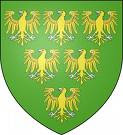2 days ago
Friday, 1 November 2013
Much more important, Novemeber 1st
is the anniversary of Piers wedding to Margaret de Clare, the niece of Edward II in 1307. It's also Kathryn's 500th post on her fabulous blog Edward II. Congratulations Kathryn and thanks for all the well-researched and fascinating posts!
Was Piers Gaveston's mother a witch?
OK, so this post tie-in is a day late - but being as it is a myth, perhaps that is no bad thing. It is a myth often repeated in historical fiction. Piers' mother was Claramonde de Marsan, and we know very little about her. Claramonde was the daughter of the great landowner Arnaud-Guillaume de Marsan, and it seems that Piers' father, Arnaud de Gabaston, was her second husband. Claramonde died in 1287, when Piers was still a child. We don't know the circumstances of her death, which is significant - because if she had been burned as a witch, undoubtedly her family would have been tarnished by association, and surely Edward Ist would not have found a place in his son's household for Piers?
Other than her family, there is nothing else available about Claramonde. So why then repeatedly in historical fiction - and, I've even seen it in 'factual' accounts about Piers, - does the myth about Claramonde being burnt at the stake for witchcraft originate? It may be something to do with one of the chroniclers of Edward II saying that 'the King loved an evil male sorcerer more than he did his wife.' It seems the chronicler thought Edward and Piers were lovers, and the only way to explain the king's love for Piers was that he had been induced by witchcraft. Accusing enemies, and usually powerful enemies, of witchcraft was a useful tool in getting rid of them. Accusations depended on interpretation. However, it seems that none of the enemies of Piers considered this a serious allegation against him. Neither was he ever accused of heresy or holding beliefs from pagan times. His excommunication was purely politically motivated. So it seems in his own lifetime, Piers' mother was never accused of being a witch.
For historical novelists, however, the accusation is a powerful tool, and we get instances of Piers bragging about his mother being a witch, and even having scarred hands as he tried to save her from the flames! Piers himself is accused of following the 'old pagan' religions, and there are scenes in novels where he takes Prince Edward to ancient ceremonies.
I guess it all makes for drama and excitement in novels! Why let the truth get in the way?!
Other than her family, there is nothing else available about Claramonde. So why then repeatedly in historical fiction - and, I've even seen it in 'factual' accounts about Piers, - does the myth about Claramonde being burnt at the stake for witchcraft originate? It may be something to do with one of the chroniclers of Edward II saying that 'the King loved an evil male sorcerer more than he did his wife.' It seems the chronicler thought Edward and Piers were lovers, and the only way to explain the king's love for Piers was that he had been induced by witchcraft. Accusing enemies, and usually powerful enemies, of witchcraft was a useful tool in getting rid of them. Accusations depended on interpretation. However, it seems that none of the enemies of Piers considered this a serious allegation against him. Neither was he ever accused of heresy or holding beliefs from pagan times. His excommunication was purely politically motivated. So it seems in his own lifetime, Piers' mother was never accused of being a witch.
For historical novelists, however, the accusation is a powerful tool, and we get instances of Piers bragging about his mother being a witch, and even having scarred hands as he tried to save her from the flames! Piers himself is accused of following the 'old pagan' religions, and there are scenes in novels where he takes Prince Edward to ancient ceremonies.
I guess it all makes for drama and excitement in novels! Why let the truth get in the way?!
Subscribe to:
Comments (Atom)


